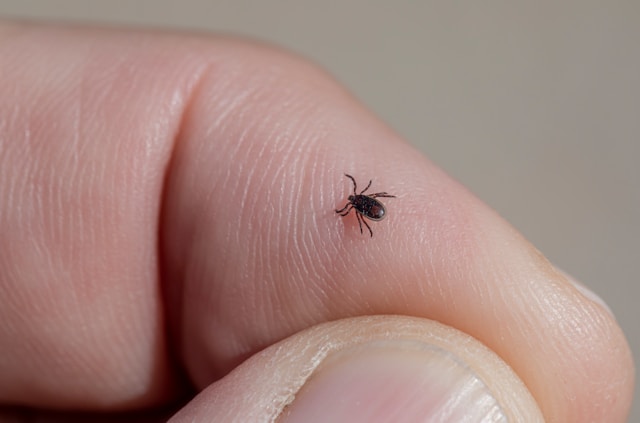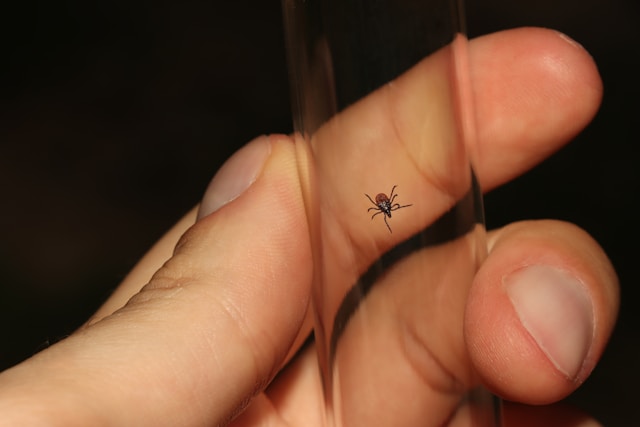3 Common Ticks in Virginia

Welcome to our guide on ticks in Virginia, a must-read for anyone living in or visiting the Old Dominion State. We're covering everything you need to know about ticks, from where they hang out to the types you might encounter and how to keep yourself and your furry pals safe.
Whether you're a seasoned nature lover or just want to protect your family at home, knowing your stuff about ticks is key to enjoying Virginia without worrying about these blood-sucking pests.
Let’s dive in!
American Dog Ticks
One of Virginia’s most prevalent tick species is the American dog tick (Dermacentor variabilis). These ticks commonly reside in grassy foliage, within woods, and even throughout urban environments full of furry animals.
As their name suggests, American dog ticks are a common annoyance for our canine friends in Virginia. However, they won’t just settle for your pooch; American dog ticks can bite humans and other mammals if given the opportunity.
So, what should you watch out for? Thankfully, identifying these pests is pretty straightforward. Female adults are reddish-brown with a characteristic white half-ovel shape above their heads. Males are similarly colored with a white molten pattern across their shells.
Female ticks are usually larger than males and can swell considerably in size after indulging in a blood meal. While males feed to satisfy their need for food, their main goal isn’t reproduction like females, who require blood to lay eggs.
Beyond being a nuisance, American dog ticks are also vectors for several dangerous diseases that can affect humans and animals. These pests can transmit Rocky Mountain spotted fever (RMSF), caused by the bacterium Rickettsia rickettsii. RMSF can cause fever, headache, rash, and other flu-like symptoms; in severe cases, it can lead to life-threatening complications.
Check out the Virginia Department of Health’s write-up on Rocky Mountain spotted fever to learn more about the signs and symptoms you should watch for!
Lone Star Tick
Named for the distinct white dot or "lone star" on the backs of adult females, Lone Star ticks are hard to miss. Adult males and growing nymphs lack these markings, but you can still pinpoint them by their reddish-brown coloration and elongated mouthparts.
These pests frequent wooded areas rife with thick vegetation, grassy fields, and hiking trails. While they prefer small to large mammals, like rodents, birds, and deer, they will still bite humans given the chance.
Lone Star ticks are aggressive feeders and can transmit diseases relatively quickly, like the southern tick-associated rash illness (STARI) and Alpha-gal syndrome. STARI can cause a spreading red rash resembling the bullseye rash of Lyme disease.
But that’s not all these tiny terrors can do! Lone Star ticks can transmit serious food allergies, causing the disease Alpha-gal syndrome, which can make you allergic to red meat and other animal by-products. In severe cases, signs include typical allergic reaction symptoms like hives, redness, swelling, and anaphylaxis.
Alpha-gal syndrome has afflicted thousands, CDC says 42% of doctors have never heard of it
Lone Star ticks can also spread diseases like ehrlichiosis, tularemia, and Heartland virus, although these infections are less common in the state.
Blacklegged Tick
The Blacklegged Tick, commonly known as the deer tick (Ixodes scapularis), is another major concern for Virginia residents. Like other species, these ticks prefer to inhabit wooded or grassy spaces, especially where deer and other wildlife are abundant.
What makes them such a threat? Well, these pests can spread Lyme disease and other tick-borne illnesses! The blacklegged tick's nymph stage is particularly worrying because of its small size. It is easy to miss as it feeds on its hosts, increasing the risk of disease transmission.
Identifying a blacklegged tick can be challenging, especially in the nymph and adult stages. Nymphs are about the size of a poppy seed, while adult females are slightly larger with reddish-brown bodies and a dark shield-like plate behind their mouthparts. Male blacklegged ticks are smaller and darker in color compared to females.
The primary worry with blacklegged tick bites is Lyme disease, a bacterial infection caused by Borrelia burgdorferi. If not treated, Lyme disease can result in severe complications affecting the joints, heart, and nervous system.
Early signs of Lyme disease might include a distinctive bullseye rash, flu-like symptoms, and joint pain. However, not all cases of Lyme disease manifest with the typical symptoms, so always seek medical attention if you experience symptoms following a tick bite.
How to Protect Yourself Against Ticks in Virginia
Whether you're exploring the mountains, having a picnic in the park, or just tending to your garden at home, taking these precautions can go a long way in keeping you and your family safe from tick encounters:

Dress Appropriately: To minimize skin exposure, wear long sleeves, long pants, and closed-toe shoes. Tuck pants into socks or boots and shirts into pants to make it harder for ticks to reach your skin.
Use Insect Repellents: Apply insect repellents containing DEET (N, N-diethyl-meta-toluamide), picaridin, or permethrin to exposed skin and clothing. Follow product instructions carefully, and reapply as needed, especially if you're sweating or swimming.
Perform Tick Checks: After being outdoors, make sure to conduct thorough tick checks on yourself, your children, and your pets. Focus on areas where ticks tend to hide, like behind your ears, along your hairline, in your armpits, and around your waistband. If needed, use a mirror or ask for assistance to check hard-to-see areas.

Create a Tick-Safe Environment: Take preventive measures to make your home and yard less welcoming to ticks. Start by trimming your grass, clearing leaf litter, and setting up barriers to deter wildlife like deer and rodents from entering your property.
Contact Us For Pest Control: For quality tick treatments in Virginia, contact us at Connor’s Pest Pros! We can eliminate tough tick infestations in your yard and keep them from returning. Struggling with pests sneaking onto your property and introducing ticks? We also offer a wildlife control service for small nuisance pests like raccoons and squirrels!
Contact us today to schedule an appointment with one of our trained technicians!
